Unit 3 Could you please tell me where the restrooms are? Section B (2a-2d) 课件(共19张PPT,内嵌音频)
文档属性
| 名称 | Unit 3 Could you please tell me where the restrooms are? Section B (2a-2d) 课件(共19张PPT,内嵌音频) | 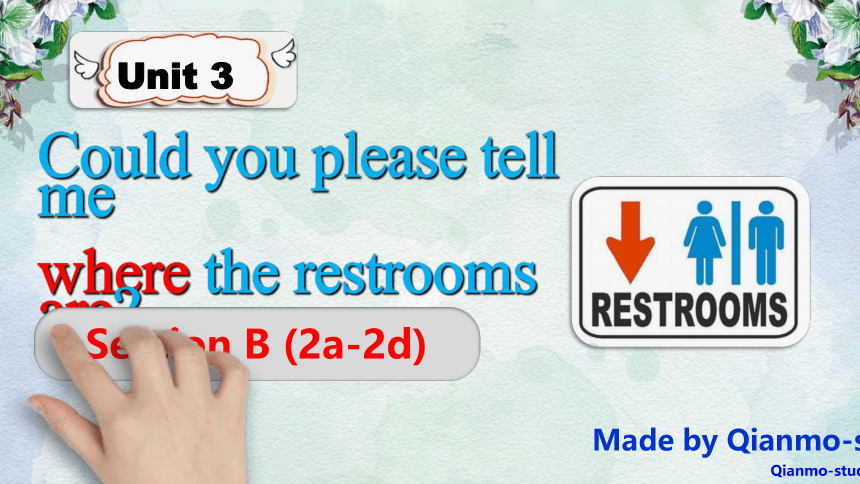 | |
| 格式 | pptx | ||
| 文件大小 | 7.5MB | ||
| 资源类型 | 教案 | ||
| 版本资源 | 人教新目标(Go for it)版 | ||
| 科目 | 英语 | ||
| 更新时间 | 2021-09-27 12:58:17 | ||
图片预览

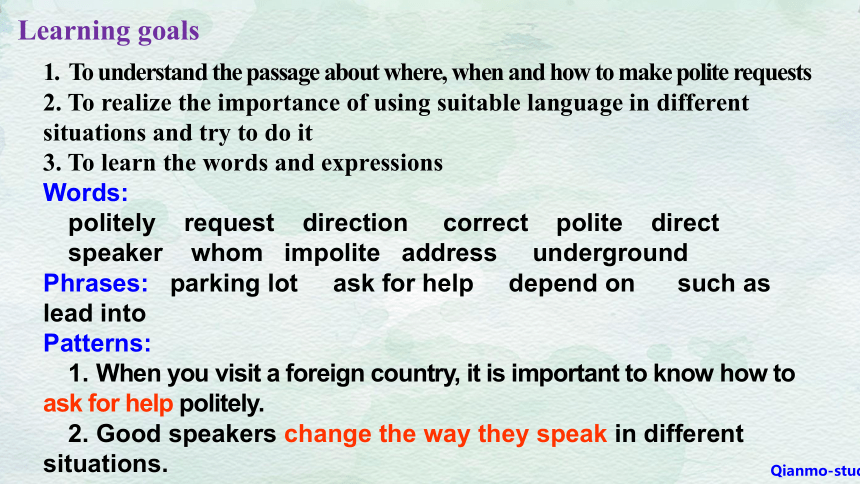
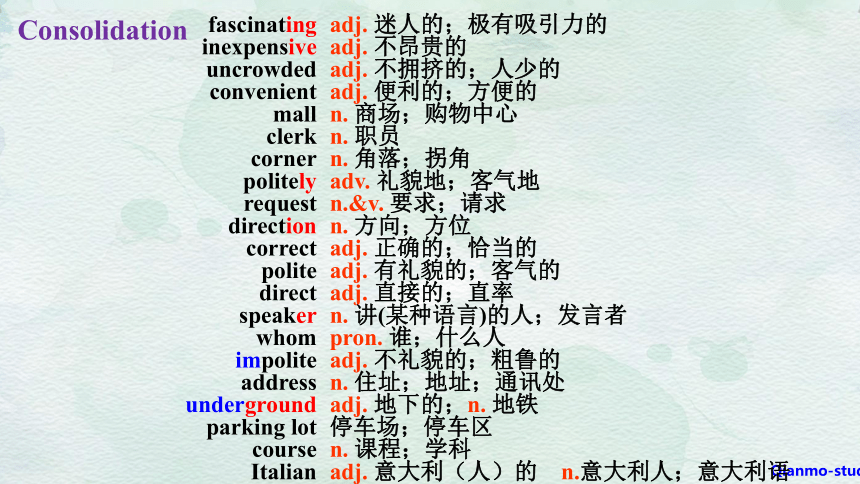
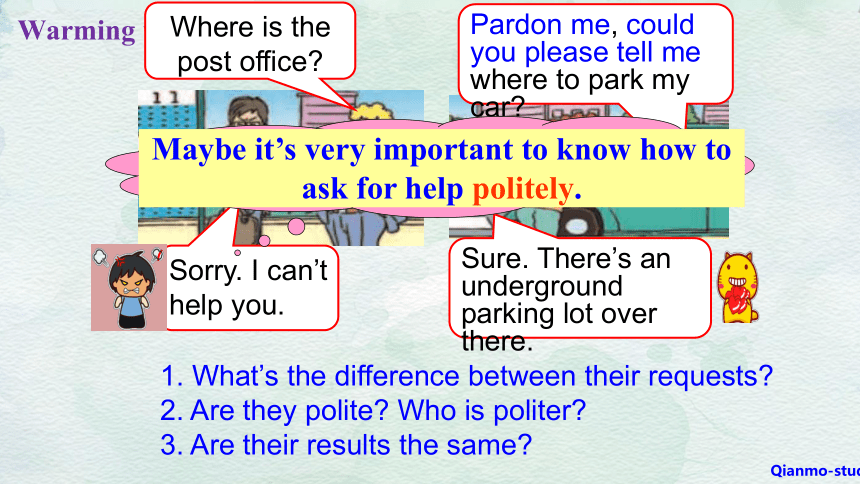
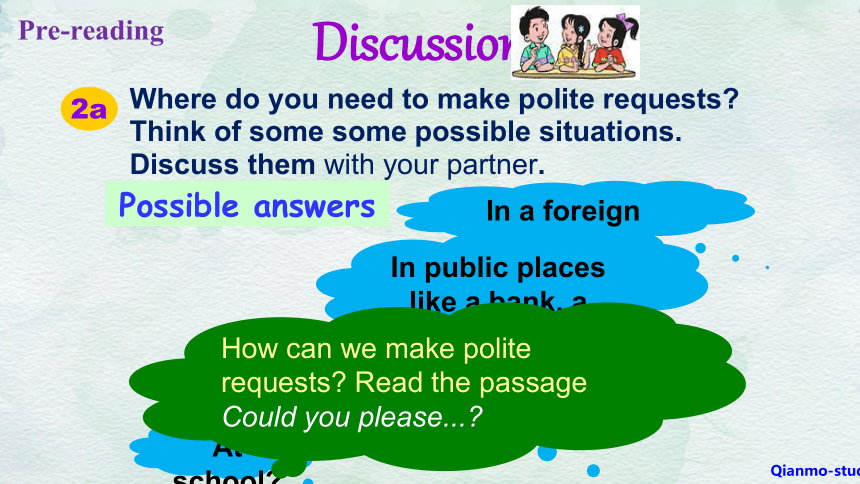
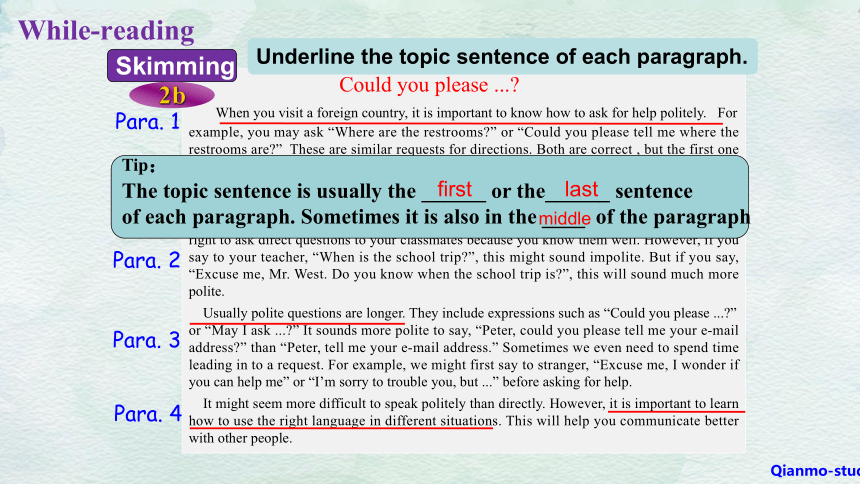
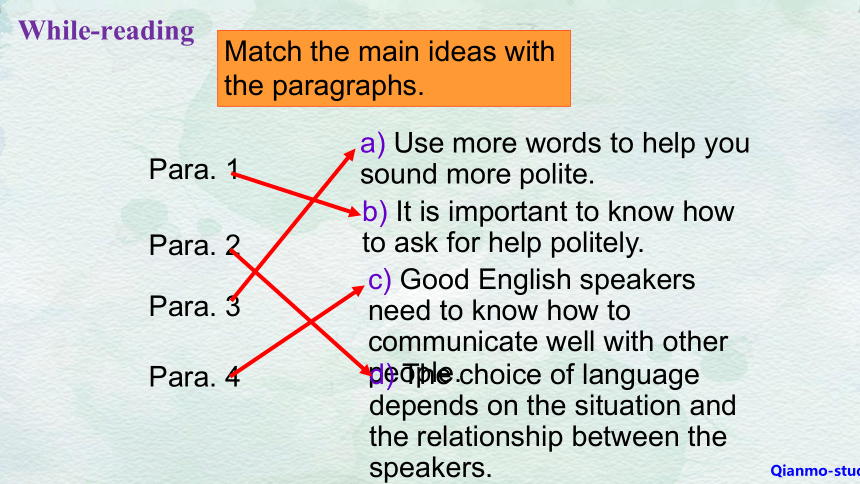
文档简介
(共19张PPT,内嵌音频)
Section
B
(2a-2d)
1.
To
understand
the
passage
about
where,
when
and
how
to
make
polite
requests
2.
To
realize
the
importance
of
using
suitable
language
in
different
situations
and
try
to
do
it
3.
To
learn
the
words
and
expressions
Words:
politely
request
direction
correct
polite
direct
speaker
whom
impolite
address
underground
Phrases:
parking
lot
ask
for
help
depend
on
such
as
lead
into
Patterns:
1.
When
you
visit
a
foreign
country,
it
is
important
to
know
how
to
ask
for
help
politely.
2.
Good
speakers
change
the
way
they
speak
in
different
situations.
3.
Usually
polite
questions
are
longer.
4.
It
might
seem
more
difficult
to
speak
politely
than
directly.
fascinating
inexpensive
uncrowded
convenient
mall
clerk
corner
politely
request
direction
correct
polite
direct
speaker
whom
impolite
address
underground
parking
lot
course
Italian
adj.
迷人的;极有吸引力的
adj.
不昂贵的
adj.
不拥挤的;人少的
adj.
便利的;方便的
n.
商场;购物中心
n.
职员
n.
角落;拐角
adv.
礼貌地;客气地
n.&v.
要求;请求
n.
方向;方位
adj.
正确的;恰当的
adj.
有礼貌的;客气的
adj.
直接的;直率
n.
讲(某种语言)的人;发言者
pron.
谁;什么人
adj.
不礼貌的;粗鲁的
n.
住址;地址;通讯处
adj.
地下的;n.
地铁
停车场;停车区
n.
课程;学科
adj.
意大利(人)的 n.意大利人;意大利语
Where
is
the
post
office?
Pardon
me,
could
you
please
tell
me
where
to
park
my
car?
Sorry.
I
can’t
help
you.
Sure.
There’s
an
underground
parking
lot
over
there.
1.
What’s
the
difference
between
their
requests?
2.
Are
they
polite?
Who
is
politer?
3.
Are
their
results
the
same?
Read
the
conversation
and
answer
the
questions.
Maybe
it’s
very
important
to
know
how
to
ask
for
help
politely.
Where
do
you
need
to
make
polite
requests?
Think
of
some
some
possible
situations.
Discuss
them
with
your
partner.
2a
In
a
foreign
country?
In
public
places
like
a
bank,
a
post
office...?
At
school?
At
home,
especially
when
speaking
to
your
elders?
Discussion
Possible
answers
How
can
we
make
polite
requests?
Read
the
passage
Could
you
please...?
Could
you
please
...?
When
you
visit
a
foreign
country,
it
is
important
to
know
how
to
ask
for
help
politely.
For
example,
you
may
ask
“Where
are
the
restrooms?”
or
“Could
you
please
tell
me
where
the
restrooms
are?”
These
are
similar
requests
for
directions.
Both
are
correct
,
but
the
first
one
sounds
less
polite.
That
is
because
it
is
a
very
direct
question.
It
is
not
enough
to
just
ask
a
question
correctly.
We
also
need
to
learn
how
to
be
polite
when
we
ask
for
help.
Good
speakers
change
the
way
they
speak
in
different
situations.
The
expressions
they
use
might
depend
on
whom
they
are
speaking
to
or
how
well
they
know
each
other
well.
It
is
all
right
to
ask
direct
questions
to
your
classmates
because
you
know
them
well.
However,
if
you
say
to
your
teacher,
“When
is
the
school
trip?”,
this
might
sound
impolite.
But
if
you
say,
“Excuse
me,
Mr.
West.
Do
you
know
when
the
school
trip
is?”,
this
will
sound
much
more
polite.
Usually
polite
questions
are
longer.
They
include
expressions
such
as
“Could
you
please
...?”
or
“May
I
ask
...?”
It
sounds
more
polite
to
say,
“Peter,
could
you
please
tell
me
your
e-mail
address?”
than
“Peter,
tell
me
your
e-mail
address.”
Sometimes
we
even
need
to
spend
time
leading
in
to
a
request.
For
example,
we
might
first
say
to
stranger,
“Excuse
me,
I
wonder
if
you
can
help
me”
or
“I’m
sorry
to
trouble
you,
but
...”
before
asking
for
help.
It
might
seem
more
difficult
to
speak
politely
than
directly.
However,
it
is
important
to
learn
how
to
use
the
right
language
in
different
situations.
This
will
help
you
communicate
better
with
other
people.
Skimming
Underline
the
topic
sentence
of
each
paragraph.
Tip:
The
topic
sentence
is
usually
the
______
or
the______
sentence
of
each
paragraph.
Sometimes
it
is
also
in
the
____
of
the
paragraph
first
last
middle
Para.
1
Para.
2
Para.
3
Para.
4
2b
Para.
1
Para.
2
Para.
3
Para.
4
a)
Use
more
words
to
help
you
sound
more
polite.
b)
It
is
important
to
know
how
to
ask
for
help
politely.
c)
Good
English
speakers
need
to
know
how
to
communicate
well
with
other
people.
d)
The
choice
of
language
depends
on
the
situation
and
the
relationship
between
the
speakers.
Match
the
main
ideas
with
the
paragraphs.
Pardon
me,
could
you
please
tell
me
where
to
park
my
car?
Excuse
me,
Mr.
West.
Do
you
know
when
the
school
trip
is?
Could
you
please
tell
me
where
the
restrooms
are?
Direct
questions
Polite
requests
Where
are
the
restrooms?
Find
the
direct
questions
and
polite
requests
from
the
passage.
2c
P23
When
is
the
school
trip?
Where’s
the
post
office?
Peter,
could
you
please
tell
me
your
e-mail
address?
How
do
we
make
direct
questions
polite?
By
adding
“excuse
me”
or
“pardon
me”
at
the
beginning
of
the
question
2.
By
using
“could”
instead
of
“can”
in
questions
3.
By
adding
“please”
Request
Person
Place
1.
Will
you
pass
the
salt?
2.
Do
you
know
where
I
can
change
some
money,
please?
3.
Could
you
tell
me
what
just
happened?
4.
Can
you
please
tell
me
where
the
nearest
station
is?
5.
Excuse
me,
do
you
know
what
time
it
begins,
please?
6.
Let
me
know
when
you’re
ready,
OK?
7.
Could
you
possibly
tell
me
the
way
to
the
village
school?
A
restaurant/
home
B
street
A/B
any
public
place/home
B
B
B
A
movie
theater
/concert
hall
street
home
street
Read
the
requests
below.
In
the
second
column,
write
A
if
you
would
say
it
to
someone
you
know
and
B
if
you
would
say
it
to
a
stranger.
In
the
last
column,
write
where
you
think
these
people
are.
2d
请求帮助
依赖;相信
例如
引入;导入
与……联系
Pay
attention
to
the
following
phrases
and
patterns.
1.
Both
are
correct,
but
the
first
one
sounds
less
polite.
less
+
adj.
/
adv.
“不那么,稍许不......”
less
+
adj.
/
adv.
than
+
比较对象
Language
points
1)
His
second
movie
is
less
interesting,
I
think.
我认为他的第二部影片就不那么有趣。
2)
I
was
less
angry
than
surprised.
我并不那么生气,更多的是惊讶。
adj.
比较对象
2.
It
might
seem
more
difficult
to
speak
politely
than
directly.
it
形式主语,无意义,放在句首避免头重脚轻;真主语:to
speak
politely
than
directly
might:情态动词“有可能,也许会”,表不确定的推测,比may语气委婉,含蓄,更不确定。
1)
It
took
me
three
days
to
finish
the
project.
完成这个项目花了我三天时间。
2)
Gina
might
not
be
able
to
go.
吉娜可能走不了。
3.
There’s
an
underground
parking
lot
over
there.
parking
lot
(美)
停车场;lot:土地
car
park(英)停车场
1)
Could
you
tell
me
where
there
is
a
parking
lot?
你能告诉我停车场在哪吗?
2)
I
left
my
car
in
the
mall
parking
lot.
我把车停到了商场的停车场。
depend
on
+名词/代词/宾语从句:
“视……而定,取决于……”
4.
Our
success
depends
on
how
well
we
can
work
with
one
another.
1)
The
price
of
this
kind
of
product
depends
on
its
quality
instead
of
its
size.
这种产品的价格取决于它的质量而不是它的大小。
2)
It
all
depend
on
whether
he
likes
the
boss
or
not.
这完全取决于他是否喜欢这个老板。
1)
They
made
a
request
for
further
aid.
他们要求再给一些帮助。
2)
Her
request
for
time
off
work
was
denied.
她的请假请求被拒绝了。
5.
These
are
similar
requests
for
directions.
request
n.
意为“请求;恳求;要求;需
求;索取”,多指对某事所提出的礼貌
或正式的恳请。
(make
a)
request
for
sth.
(做出)……的要求
Asking
for
help
politely
They
(1)_______the
way
they
speak
in
different
situations.
Their
expressions
depend
on
(2)_______
they
are
speaking
to
or
(3)
_______
they
know
each
other.
①Someone
you
know:
It's
all
right
to
ask
(4)________________.
②Stranger:
*Use
some
expressions
such
as
“(5)____________please
…?”
or
“May
I
ask
…?”
*
Spend
time
(6)____________a
request.
Speaking
politely
can
help
you(7)
_________________
with
others.
change
whom
how
well
Could
you
leading
into
communicate
better
Complete
the
mind
map
according
to
the
passage.
Could
you
please...?
direct
questions
Translate
the
phrases
into
English
1.请求帮助
ask
for
help
2.依赖;相信
depend
on
3.例如
such
as
4.引入;导入
lead
into
5.与……联系
communicate
with
I.
根据句意及汉语提示,填写单词。
You
can
find
the
________
(地址)
outside
of
the
house.
2.
I
need
a
_____
(直截了当的)answer
to
this
question.
3.
It
is
important
to
know
how
to
ask
for
help
_________(礼貌地).
4.
I
_______
(想知道)
if
Mr.
Green
will
go
swimming
with
us
tomorrow.
5.
I’m
not
sure
of
the
________
(正确的)
spelling.
direct
wonder
address
politely
correct
II.
翻译下列句子
1.
他们请求提供情况。
They
made
a
request
for
information.
2.
孩子们依靠父母满足他们所有的需要。
Children
depend
on
their
parents
for
all
of
their
needs.
3.
火车也许会晚点几个小时。
The
train
might
be
a
few
hours
late.
1.
Review
the
new
words
and
expressions
you’ve
learned
today.
2.
Read
the
articles
in
2b
page
22.
3.
Finish
the
exercises
in
workbooks.
4.
Preview
the
new
words
and
expressions.
5.
Preview
3a-3b
on
page
23-24.
Section
B
(2a-2d)
1.
To
understand
the
passage
about
where,
when
and
how
to
make
polite
requests
2.
To
realize
the
importance
of
using
suitable
language
in
different
situations
and
try
to
do
it
3.
To
learn
the
words
and
expressions
Words:
politely
request
direction
correct
polite
direct
speaker
whom
impolite
address
underground
Phrases:
parking
lot
ask
for
help
depend
on
such
as
lead
into
Patterns:
1.
When
you
visit
a
foreign
country,
it
is
important
to
know
how
to
ask
for
help
politely.
2.
Good
speakers
change
the
way
they
speak
in
different
situations.
3.
Usually
polite
questions
are
longer.
4.
It
might
seem
more
difficult
to
speak
politely
than
directly.
fascinating
inexpensive
uncrowded
convenient
mall
clerk
corner
politely
request
direction
correct
polite
direct
speaker
whom
impolite
address
underground
parking
lot
course
Italian
adj.
迷人的;极有吸引力的
adj.
不昂贵的
adj.
不拥挤的;人少的
adj.
便利的;方便的
n.
商场;购物中心
n.
职员
n.
角落;拐角
adv.
礼貌地;客气地
n.&v.
要求;请求
n.
方向;方位
adj.
正确的;恰当的
adj.
有礼貌的;客气的
adj.
直接的;直率
n.
讲(某种语言)的人;发言者
pron.
谁;什么人
adj.
不礼貌的;粗鲁的
n.
住址;地址;通讯处
adj.
地下的;n.
地铁
停车场;停车区
n.
课程;学科
adj.
意大利(人)的 n.意大利人;意大利语
Where
is
the
post
office?
Pardon
me,
could
you
please
tell
me
where
to
park
my
car?
Sorry.
I
can’t
help
you.
Sure.
There’s
an
underground
parking
lot
over
there.
1.
What’s
the
difference
between
their
requests?
2.
Are
they
polite?
Who
is
politer?
3.
Are
their
results
the
same?
Read
the
conversation
and
answer
the
questions.
Maybe
it’s
very
important
to
know
how
to
ask
for
help
politely.
Where
do
you
need
to
make
polite
requests?
Think
of
some
some
possible
situations.
Discuss
them
with
your
partner.
2a
In
a
foreign
country?
In
public
places
like
a
bank,
a
post
office...?
At
school?
At
home,
especially
when
speaking
to
your
elders?
Discussion
Possible
answers
How
can
we
make
polite
requests?
Read
the
passage
Could
you
please...?
Could
you
please
...?
When
you
visit
a
foreign
country,
it
is
important
to
know
how
to
ask
for
help
politely.
For
example,
you
may
ask
“Where
are
the
restrooms?”
or
“Could
you
please
tell
me
where
the
restrooms
are?”
These
are
similar
requests
for
directions.
Both
are
correct
,
but
the
first
one
sounds
less
polite.
That
is
because
it
is
a
very
direct
question.
It
is
not
enough
to
just
ask
a
question
correctly.
We
also
need
to
learn
how
to
be
polite
when
we
ask
for
help.
Good
speakers
change
the
way
they
speak
in
different
situations.
The
expressions
they
use
might
depend
on
whom
they
are
speaking
to
or
how
well
they
know
each
other
well.
It
is
all
right
to
ask
direct
questions
to
your
classmates
because
you
know
them
well.
However,
if
you
say
to
your
teacher,
“When
is
the
school
trip?”,
this
might
sound
impolite.
But
if
you
say,
“Excuse
me,
Mr.
West.
Do
you
know
when
the
school
trip
is?”,
this
will
sound
much
more
polite.
Usually
polite
questions
are
longer.
They
include
expressions
such
as
“Could
you
please
...?”
or
“May
I
ask
...?”
It
sounds
more
polite
to
say,
“Peter,
could
you
please
tell
me
your
address?”
than
“Peter,
tell
me
your
address.”
Sometimes
we
even
need
to
spend
time
leading
in
to
a
request.
For
example,
we
might
first
say
to
stranger,
“Excuse
me,
I
wonder
if
you
can
help
me”
or
“I’m
sorry
to
trouble
you,
but
...”
before
asking
for
help.
It
might
seem
more
difficult
to
speak
politely
than
directly.
However,
it
is
important
to
learn
how
to
use
the
right
language
in
different
situations.
This
will
help
you
communicate
better
with
other
people.
Skimming
Underline
the
topic
sentence
of
each
paragraph.
Tip:
The
topic
sentence
is
usually
the
______
or
the______
sentence
of
each
paragraph.
Sometimes
it
is
also
in
the
____
of
the
paragraph
first
last
middle
Para.
1
Para.
2
Para.
3
Para.
4
2b
Para.
1
Para.
2
Para.
3
Para.
4
a)
Use
more
words
to
help
you
sound
more
polite.
b)
It
is
important
to
know
how
to
ask
for
help
politely.
c)
Good
English
speakers
need
to
know
how
to
communicate
well
with
other
people.
d)
The
choice
of
language
depends
on
the
situation
and
the
relationship
between
the
speakers.
Match
the
main
ideas
with
the
paragraphs.
Pardon
me,
could
you
please
tell
me
where
to
park
my
car?
Excuse
me,
Mr.
West.
Do
you
know
when
the
school
trip
is?
Could
you
please
tell
me
where
the
restrooms
are?
Direct
questions
Polite
requests
Where
are
the
restrooms?
Find
the
direct
questions
and
polite
requests
from
the
passage.
2c
P23
When
is
the
school
trip?
Where’s
the
post
office?
Peter,
could
you
please
tell
me
your
address?
How
do
we
make
direct
questions
polite?
By
adding
“excuse
me”
or
“pardon
me”
at
the
beginning
of
the
question
2.
By
using
“could”
instead
of
“can”
in
questions
3.
By
adding
“please”
Request
Person
Place
1.
Will
you
pass
the
salt?
2.
Do
you
know
where
I
can
change
some
money,
please?
3.
Could
you
tell
me
what
just
happened?
4.
Can
you
please
tell
me
where
the
nearest
station
is?
5.
Excuse
me,
do
you
know
what
time
it
begins,
please?
6.
Let
me
know
when
you’re
ready,
OK?
7.
Could
you
possibly
tell
me
the
way
to
the
village
school?
A
restaurant/
home
B
street
A/B
any
public
place/home
B
B
B
A
movie
theater
/concert
hall
street
home
street
Read
the
requests
below.
In
the
second
column,
write
A
if
you
would
say
it
to
someone
you
know
and
B
if
you
would
say
it
to
a
stranger.
In
the
last
column,
write
where
you
think
these
people
are.
2d
请求帮助
依赖;相信
例如
引入;导入
与……联系
Pay
attention
to
the
following
phrases
and
patterns.
1.
Both
are
correct,
but
the
first
one
sounds
less
polite.
less
+
adj.
/
adv.
“不那么,稍许不......”
less
+
adj.
/
adv.
than
+
比较对象
Language
points
1)
His
second
movie
is
less
interesting,
I
think.
我认为他的第二部影片就不那么有趣。
2)
I
was
less
angry
than
surprised.
我并不那么生气,更多的是惊讶。
adj.
比较对象
2.
It
might
seem
more
difficult
to
speak
politely
than
directly.
it
形式主语,无意义,放在句首避免头重脚轻;真主语:to
speak
politely
than
directly
might:情态动词“有可能,也许会”,表不确定的推测,比may语气委婉,含蓄,更不确定。
1)
It
took
me
three
days
to
finish
the
project.
完成这个项目花了我三天时间。
2)
Gina
might
not
be
able
to
go.
吉娜可能走不了。
3.
There’s
an
underground
parking
lot
over
there.
parking
lot
(美)
停车场;lot:土地
car
park(英)停车场
1)
Could
you
tell
me
where
there
is
a
parking
lot?
你能告诉我停车场在哪吗?
2)
I
left
my
car
in
the
mall
parking
lot.
我把车停到了商场的停车场。
depend
on
+名词/代词/宾语从句:
“视……而定,取决于……”
4.
Our
success
depends
on
how
well
we
can
work
with
one
another.
1)
The
price
of
this
kind
of
product
depends
on
its
quality
instead
of
its
size.
这种产品的价格取决于它的质量而不是它的大小。
2)
It
all
depend
on
whether
he
likes
the
boss
or
not.
这完全取决于他是否喜欢这个老板。
1)
They
made
a
request
for
further
aid.
他们要求再给一些帮助。
2)
Her
request
for
time
off
work
was
denied.
她的请假请求被拒绝了。
5.
These
are
similar
requests
for
directions.
request
n.
意为“请求;恳求;要求;需
求;索取”,多指对某事所提出的礼貌
或正式的恳请。
(make
a)
request
for
sth.
(做出)……的要求
Asking
for
help
politely
They
(1)_______the
way
they
speak
in
different
situations.
Their
expressions
depend
on
(2)_______
they
are
speaking
to
or
(3)
_______
they
know
each
other.
①Someone
you
know:
It's
all
right
to
ask
(4)________________.
②Stranger:
*Use
some
expressions
such
as
“(5)____________please
…?”
or
“May
I
ask
…?”
*
Spend
time
(6)____________a
request.
Speaking
politely
can
help
you(7)
_________________
with
others.
change
whom
how
well
Could
you
leading
into
communicate
better
Complete
the
mind
map
according
to
the
passage.
Could
you
please...?
direct
questions
Translate
the
phrases
into
English
1.请求帮助
ask
for
help
2.依赖;相信
depend
on
3.例如
such
as
4.引入;导入
lead
into
5.与……联系
communicate
with
I.
根据句意及汉语提示,填写单词。
You
can
find
the
________
(地址)
outside
of
the
house.
2.
I
need
a
_____
(直截了当的)answer
to
this
question.
3.
It
is
important
to
know
how
to
ask
for
help
_________(礼貌地).
4.
I
_______
(想知道)
if
Mr.
Green
will
go
swimming
with
us
tomorrow.
5.
I’m
not
sure
of
the
________
(正确的)
spelling.
direct
wonder
address
politely
correct
II.
翻译下列句子
1.
他们请求提供情况。
They
made
a
request
for
information.
2.
孩子们依靠父母满足他们所有的需要。
Children
depend
on
their
parents
for
all
of
their
needs.
3.
火车也许会晚点几个小时。
The
train
might
be
a
few
hours
late.
1.
Review
the
new
words
and
expressions
you’ve
learned
today.
2.
Read
the
articles
in
2b
page
22.
3.
Finish
the
exercises
in
workbooks.
4.
Preview
the
new
words
and
expressions.
5.
Preview
3a-3b
on
page
23-24.
同课章节目录
- Unit 1 How can we become good learners.
- Section A
- Section B
- Unit 2 I think that mooncakes are delicious!
- Section A
- Section B
- Unit 3 Could you please tell me where the restroom
- Section A
- Section B
- Unit 4 I used to be afraid of the dark.
- Section A
- Section B
- Unit 5 What are the shirts made of?
- Section A
- Section B
- Review of Units 1-5
- Unit 6 When was it invented?
- Section A
- Section B
- Unit 7 Teenagers should be allowed to choose their
- Section A
- Section B
- Unit 8 It must belong to Carla.
- Section A
- Section B
- Unit 9 I like music that I can dance to.
- Section A
- Section B
- Unit 10 You're supposed to shake hands.
- Section A
- Section B
- Review of Units 6-10
- Unit 11 Sad movies make me cry.
- Section A
- Section B
- Unit 12 Life is full of the unexpected
- Section A
- Section B
- Unit 13 We're trying to save the earth!
- Section A
- Section B
- Unit 14 I remember meeting all of you in Grade 7.
- Section A
- Section B
- Review of Units 11-14
